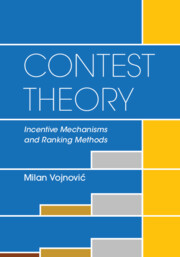Book contents
- Frontmatter
- Contents
- Preface
- 1 Introduction and Preview
- 2 Standard All-Pay Contest
- 3 Rank-Order Allocation of Prizes
- 4 Smooth Allocation of Prizes
- 5 Simultaneous Contests
- 6 Utility Sharing and Welfare
- 7 Sequential Contests
- 8 Tournaments
- 9 Rating Systems
- 10 Ranking Methods
- 11 Appendix
- References
- Index to Notations
- Index
11 - Appendix
Published online by Cambridge University Press: 05 January 2016
- Frontmatter
- Contents
- Preface
- 1 Introduction and Preview
- 2 Standard All-Pay Contest
- 3 Rank-Order Allocation of Prizes
- 4 Smooth Allocation of Prizes
- 5 Simultaneous Contests
- 6 Utility Sharing and Welfare
- 7 Sequential Contests
- 8 Tournaments
- 9 Rating Systems
- 10 Ranking Methods
- 11 Appendix
- References
- Index to Notations
- Index
Summary
In the Appendix we define various mathematical concepts and state some of the theorems that are invoked at various places in the book. Most of the theorems are accompanied by proofs, with a few exceptions in which case we refer to the relevant literature.
Section 11.1 introduces the basic concepts of relations and orderings, sets, convex functions and optimization, the envelope theorem, some functional equations, and fixed-point theorems. The concept of a partial order is used in particular in Chapter 9 and Chapter 10. The convex optimization and the envelope theorem are used in Chapter 4. The Cauchy functional equations appear in the proofs of Theorem 4.2 and Theorem 10.15, and a functional equation related to trigonometric equations appears in the proof of Theorem 9.13. The fixed-point theorems are invoked in Section 11.3.
Section 11.2 covers some elements of probability and statistics including order statistics, distributions on a simplex, and Gaussian distributions. The order statistics are used throughout this book, but perhaps most prominently in Chapter 3. The distributions on a simplex are used in Chapter 5 to establish the existence of mixed-strategy Nash equilibria for the Colonel Blotto games. Some properties of Gaussian distributions are used in the context of approximate Bayesian inference for rating systems in Chapter 9.
In Section 11.3 we cover some special normal form games including concave, potential, and smooth games. The concept of a concave game that we discuss in Section 11.3.1 appears at several places in Chapter 4 and Chapter 6. In particular, we state and prove Rosen's theorem (Theorem 11.51) on the existence of a pure-strategy Nash equilibrium for concave games. The concept of a potential game, the existence of a pure-strategy Nash equilibrium for potential games, and conditions for a normal form game to be a potential game are discussed in Section 11.3.2. Some of these results are used in Chapter 5 to establish the existence of a pure-strategy Nash equilibrium of a normal form game that models a system of simultaneous contests, and in Chapter 6 for the utility sharing games with convex utility of production functions. The concept of a smooth game, different variants of smooth games, and the price of anarchy bounds that hold for smooth games are discussed in Section 11.3.3.
- Type
- Chapter
- Information
- Contest TheoryIncentive Mechanisms and Ranking Methods, pp. 617 - 680Publisher: Cambridge University PressPrint publication year: 2016



